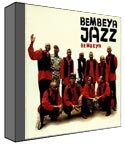Bembeya Jazz, led by singer Aboucar Demba Camara, were one of those bands. When they formed in 1961 in the remote town of Beyla, by the Bembeya River, they were just one of many "orchestras" all over Guinea trying to find fame. Then they added a young guitarist, Sekou Diabaté, whose sparkling fretwork would bring him the nickname "Diamond Fingers," and something clicked. Suddenly, the 10-piece group had a secret weapon, and they began sweeping all before them. Bembeya Jazz's mix of hypnotic native griot melodies with Cuban and tribal rhythms, played on electric instruments and horns, resonated throughout the country. By 1965, they'd landed in Conakry, one of three certified "national bands," paid wages by the government to make music.
It was no sinecure. They were expected to start rehearsing every morning at 9, then play each night until 2. Filling out their sound with two more guitars and with Diamond Fingers adding Hawaiian slide to his fretboard arsenal, they quickly reached their first of many creative peaks with the epic "Regard Sure Le Passé." Written to celebrate the legendary Manding leader Almany Samory Toure, it strung together several griot songs about Toure. Building from a folkloric opening with balafon (a kind of xylophone), it exploded into a hot groove, climaxing with a searing solo from Diamond Fingers into a 34-minute epic that showcased all the band's strengths.
In the '60s, musicians throughout Africa were reclaiming their traditions and adding the propulsive syncopations of Cuba. Mali's Super Rail Band, under the direction of fluid guitarist Djelimady Tounkara, fired up the crowds every night at the Station Hotel in Bamako, while Senegal's Orchestra Baobab offered silkier Latin sounds in Dakar. Along with Bembeya Jazz, they became the holy trinity of African groups—which, in 2003, they remain. The Super Rail Band, still led by Tounkara, remain a fixture on the world music scene. A re-formed Orchestra Baobab still carry the torch for Afro-Cuban sounds on last year's superb Specialists in All Styles. To round it out, Bembaya Jazz have returned from a 14-year recording hiatus with Bembeya (World Village).
UNLIKE THOSE OTHER bands, who refine their respective styles on their recent releases, Bembeya looks to the past, revisiting old songs, several of which have powerful griot elements. The band makes their tradition swing. Diamond Fingers can lull with his gentle slide style at the start of "Gbapie," or fire off a searing solo on "A Koukou We," first recorded in the '70s, with its irresistible vocal hook.
Four of the original band members, including horn players Doré Clement and Mohamed Keba and drummer Condé Mory Mangala, are rounded out with eight musicians of more recent vintage. Among them is Salifou Kaba, part of a vocal trio recruited after Aboucar Camara died in a car wreck in 1973. His high tenor shines throughout, especially on "Lefa," a song originally written by Camara about the controversial practice of female circumcision. "Yelema Yelemaso" offers a nod back to the late '80s, when the group was limping to a halt.
During that decade the orchestra found themselves playing less and less, even though President Toure had given them their own nightclub, Club Bembeya, and paid for new instruments. The griot style that had been their trademark had fallen out of fashion. There was an attempt to keep pace with the times, but the music on 1988's Wa Kelé was far from convincing, even to the people who made it. A downsized version of Bembeya Jazz toured the U.S. in 1989, then went into hibernation. Diamond Fingers moved to Paris and released a solo disc. It wasn't until 1999 that they all came together again, for a concert celebrating the centenary of Samory Toure's death.
The success of the reunion brought more shows and eventually an offer from French producer Christian Mousset to record. The timing was auspicious. The best-selling Buena Vista Social Club had put the spotlight on an older generation of artists (the original intent of the project was to pair Malian and Cuban musicians), who responded in fine style, winning critical plaudits and a surprisingly warm commercial reception in the U.S. The Super Rail Band had never sounded hotter, both live and on disc, while the reissue of Orchestra Baobab's 1982 classic, Pirates Choice, brought glowing reviews and paved the way for their return. It all served to prime the pump for Bembeya Jazz's comeback.
Bembeya Jazz are older and perhaps a little more staid—Diamond Fingers no longer performs the Hendrix-like body contortions he did in the '60s—and on Bembeya the horn lines are sassy rather than wild. But it's clear that they relish this second chance in the spotlight: The grooves are still sinuous and powerful (check the percussion breakdown of "Soli Au Wassoulou"), and the joy they take in their performances remains utterly youthful.



